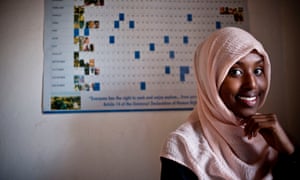‘Sense of duty’ sees Somali refugees head home
From Britain to Canada, people who have spent decades away are bringing their skills to rebuild their countryGlobal development is supported by
 About this content
About this contentTracy McVeigh Galkayo, Somalia
Sat 24 Mar 2018 21.05 GMTLast modified on Sat 24 Mar 2018 22.00 GMT
Shares
86

Saredo Mohamed has returned from Canada to be a facilitator at the Galkayo Education Centre in Galkayo, Somalia. Photograph: Kate Holt/Unicef
Slapping a large piece of equipment wrapped in packing materials, Dr Mohamed Hussein Aden smiles: “The Swiss sent us this but unfortunately not with the instruction manual so we don’t know how to use it. It’s sat here for a good few years now. Shame really.” The ceiling of the theatre is sagging and the operating table stained and split. It’s a far cry from Harrow, north London, where Aden lived and worked before returning in 2012 to Somalia, from where he fled as a refugee in 1994.
Now he is the director of Galkayo hospital, the main facility for the inhabitants of Somalia’s third city and for those living for hundreds of miles around in the drought-hit countryside.
“I came back in 2012. We Somalians have always felt a duty, an obligation, to support those back home, and now we are coming back, bringing the skills back, engineering, building, medicine. So many of our politicians are from the diaspora,” said Aden, 62, who harbours political ambitions. Four of his six children have returned with him, he said, seeing Somalia’s fragile peace as an opportunity.
Somalia’s president, Mohamed Abdullahi Mohamed, has dual US and Somalian citizenship. In his cabinet and ministries British accents vie with those from US, Canada and other parts of Europe. The aid agencies and civil society are full of young people like Saredo Mohamed, 22, born in Canada to Somali parents, who is relearning her mother tongue and culture.
“You see a lot of people in my age group coming back, it is a wonderful opportunity to give back and also to learn about my culture,” she said. Mohamed is working at Galkayo Education Centre for Peace and Development, founded by her aunt Hawa Aden Mohamed, another returnee from Canada.
The sheer numbers of diaspora returnees is unique to a country that has seen decades of war and lawlessness. In 2015, two million Somalis living outside the country were sending home so much money to support the households who stayed behind that the remittances accounted for 23% of GDP.
There have been tensions. Local Somalis have sometimes demanded more rights than those who have spent decades or whole lives abroad while returnees have been accused of assuming superiority due to their education and experience. A symposium was held in the capital Mogadishu last June to attempt to bridge such gaps.
“Such efforts hope to see people who have stayed and foreign returnees rebuilding Somalia together,” said Aden. “The diaspora has a big role, many of the young people come back and have a real culture shock. My son, 25, was really shocked when he arrived from London, it took 35 days for him to assimilate, now he is drinking camel’s milk!
“Myself, I came back after 28 years because my sister was dying. I said I would stay three months. Here I am after five years.”
Aden shows the work being done on a new building in the hospital’s compound: “Eighty per cent of the funding comes directly from the diaspora, mainly Europe, the Scandinavians, Denmark. We are really changing the town.” The construction work is being done by a company owned by Ali Dhaaf Abdi, aged 42, fresh from Norway. His Norwegian-born wife is still adjusting to this dusty city where only a handful of buildings are over one storey, and only one more than two storeys. “We will soon change that,” said Abdi. “For $25,000 I can build you a house for a family of four … I am building houses here for people from Sweden, from Canada, from the UK.
“I came back because while it is easy to make a business in Europe, it is difficult to grow bigger. Here I can expand. And this is my country. Now I have 120 employees. They welcome me here for the jobs.
“I do miss the security, Galkayo is very fragile. I also miss supermarkets and the high quality of clothing, but the education is the same. We have good wi-fi, my children come and go between here and Oslo.”
I wouldn't last a day.
